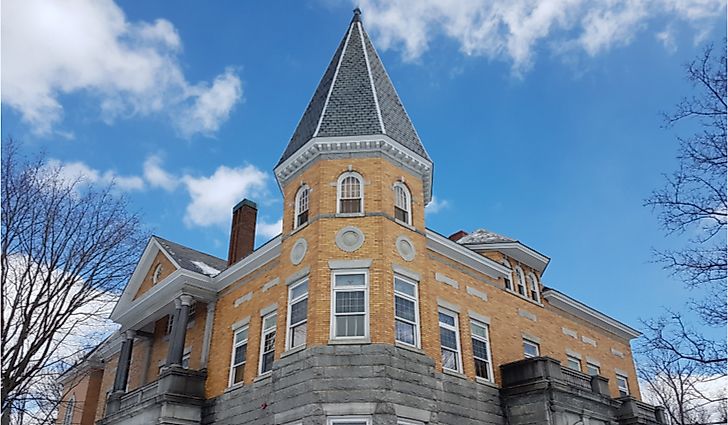Did You Know There's An Opera House Where The Stage And Audience Are In Different Nations?

Description
The Haskell Free Library and Opera House is a 400-person capacity historical arts facility on the border of the United States and Canada. The stage of the facility is in the town of Stanstead in the province of Quebec in Canada, while the audience sits in Derby Line village in the state of Vermont in the U.S. The Haskell Free Library and Opera House also has two addresses, and phone lines for both countries. It has a dressing room, fly space, green room, loading dock, movie screen and projection facility, and an orchestra pit as well, according to Creative Ground. The Haskell Free Library and Opera House supports the cultural needs of communities on either side of the border, hence performances can be viewed in either English or French.
History
The design of the Haskell Free Library and Opera House was created by local Stanstead architect James Ball and his partner, Gilbert Smith, who was from Boston. Its cornerstone was laid on October 15th, 1901, by Colonel Horace Stewart Haskell and members of Stanstead’s Golden Rule Lodge with help from well-known Masons from either side of the U.S.-Canada border. Construction was overseen by Nathan Beach, a contractor from Georgeville, Quebec, and after several delays its construction was completed in 1904 at a cost of about $50,000, a huge sum at that time. The Haskell Free Library and Opera House is classified as a historic site by the Canadian, the United States', and Province of Quebec's governments.
Motivation for the Construction
Construction of the Haskell Free Library and Opera House was initiated by Martha Stewart Haskell and her son, Colonel Horace Stewart Haskell. Martha dedicated it to her late husband Carlos Haskell, who was a prominent merchant, according to Haskell Opera History (HOH). Martha and her son viewed the arts facility as a gift to the border communities, wherein they could learn and be culturally enriched at this center on the U.S.-Canada border. The Opera house on the second floor was also designated according to a 1908 original charter to support and maintain the library downstairs, according to HOH.
Quirky Uniqueness
The Haskell Free Library and Opera House is the only opera house in the world that is split into two by an international border. Its front door is in the U.S., the library's circulation desk and all the books are in Canada, while the reading room is internationally divided. According to the Canadian Immigration and Visa Information, after the September of 2001 terrorist attacks in the U.S., Americans have become stricter regarding the border where the arts facility sits. One can park in Canada and walk across the border to the front door, but U.S. officials watch to ensure you go back the same way you came. This security has also curtailed the once more frequent movements across the border.
Modern Day Prominence
Being constructed on two countries' borders has made the Haskell Free Library and Opera House an object of fascination that attracts tourists from around the world. This arts facility has been covered by media such as Life Magazine, Canadian Geographic, New York Times, Ripley’s Believe It or Not, and others. According to ONE New England Arts magazine, its library has over 20,000 books, some in French and others in the English language, as well as computer workstations. Most of the Haskell library patrons come from Canada, as Northeastern Vermont has many more libraries as compared to the border region in Quebec.
In Popular Culture
Prominent speakers to have been hosted at the Haskell Free Library and Opera House include William Jennings Bryan, a U.S politician, Canadian Arctic explorer Vilhjalmur Stefansson, and Canadian poet E. Pauline Johnson. Musical genres that have been performed here include jazz, blues, folk, bluegrass, rock, symphony orchestra, and classical music. Adult and children’s theaters alike have had shows at the Haskell Free Library and Opera House as well. Some past performers have even left their signatures on the dressing room walls, many of which have been preserved into the present date.











